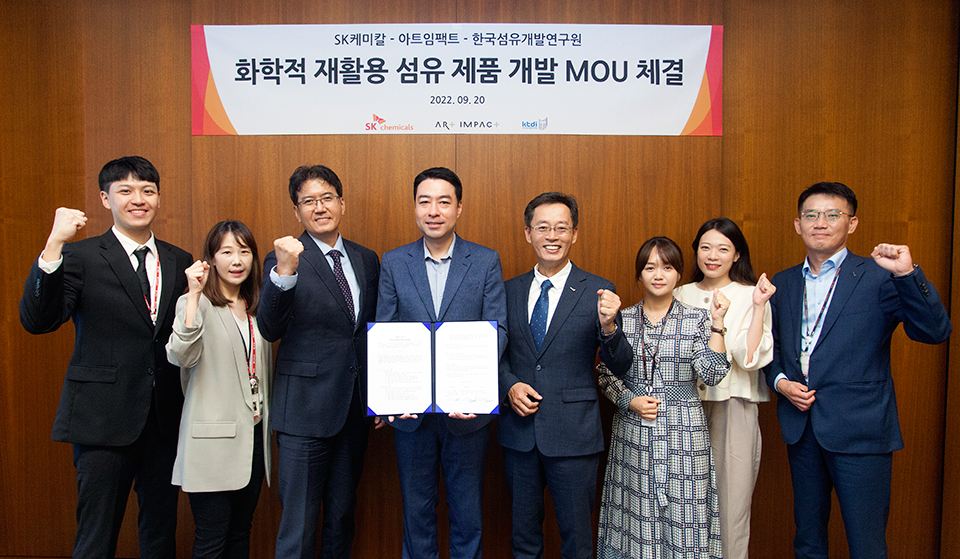- SK chemicals, Art Impact, and Korea Textile Development Institute sign an agreement for the development and sales of fabric produced by chemical recycling
- With infinite plastic recycling technology, the parties aim to expand the use of recycled plastic from toothbrushes to clothing through the EUUM platform
SK chemicals begins supplying chemically recycled materials to the sustainable textile and fashion markets in earnest.
SK chemicals (CEO: Jeon Kwang-hyun) announced on the 20th that the company signed a business agreement for the “development of chemically recycled fibers (yarns and fabrics)” at the headquarters of SK chemicals located in Pangyo. Song Yun-il, CEO of Art Impact, Ho Yo-seung, head of the Korea Textile Development Institute, and Kim Hyun-seok, head of SK chemicals' Green Chemicals Business Division, attended the ceremony.
The three parties plan to actively cooperate to develop and sell high-quality recycled fibers using SK chemicals' chemically recycled material “SKYPET CR”. Under this agreement, SK chemicals will supply “SKYPET CR”, which is necessary for yarn and fabric development to the Korea Textile Development Institute, which will produce various yarns from this raw material. Art Impact plans to sell the fabric developed from chemically recycled fiber yarns produced by the Korea Textile Research Institute through the company’s online platform. Art Impact also plans to use the yarn to produce its own fashion brand products.
“Chemical Recycling” refers to a technology that produces polymer plastics by breaking down waste plastics into pure, raw materials. Unlike physically recycled materials, chemically recycled PET material “SKYPET CR” has fewer microscopic foreign substances. Therefore, it can be used to produce high-quality fibers for formal and casual clothing, functional sports apparel, curtains, bedding, and other fabric products.
This collaborative project was promoted through SK chemicals' plastic recycling ecosystem platform, “EUUM” (www.e-uum.com). SK chemicals' efforts to build a plastic recycling ecosystem have been a great success. SK chemicals aims to achieve a virtuous cycle of plastic recycling by continuously connecting the parties involved in the plastic circulation ecosystem through EUUM, as the company has achieved this time through collaboration with an eco-friendly social enterprise and a research institute specializing in textile production technology.
Art Impact is a social venture company that produces and sells eco-friendly fashion materials and products. Last year, the company launched “Fabric Q” (www.fabricurator.com), an online platform that makes it easy to purchase eco-friendly fabrics for designers and brands. The company plans to sell chemically recycled fabrics jointly developed through this platform.
Korea Textile Development Institute is a research institute established in 1983 to support Korean textile companies to prepare for new trends and to enhance the competitiveness of the textile industry with innovative application and processing technologies. Recently, the institute is focusing on revitalizing the eco-friendly textile industry by promoting a project for creating a green fiber platform for recycling PET bottles with Daegu.
The global textile and fashion market is expected to expand significantly due to the strengthening of environmental regulations in developed countries and the spread of consumers' eco-friendly awareness. According to Statista, a global market research firm, the global apparel market is expected to reach USD 1.95 trillion (KRW 2.528 quadrillion) in 2026, and the share of the sustainable apparel market is expected to reach USD 119 billion (KRW 154 trillion), or 6.1%.
Ho Yo-seung, director of the Korea Textile Development Institute, said, “We will strive to lead the development of the eco-friendly textile industry together with our partners by securing technology to manufacture textile materials using chemically recycled raw materials.”
Kim Hyun-seok, head of SK chemicals' Green Chemical division said, “Reducing greenhouse gas emissions is a hot topic, not only among fashion companies but also automobile, furniture, and home appliance companies. The demand for chemically recycled fibers with differentiated properties will continue to grow rapidly.” He added, “We expect that the interest in recycled yarn will increase even more as the trend of environment-friendly consumption grows.”
Meanwhile, SK chemicals is jointly developing an eco-friendly toothbrush with KNK through a green project that discovers markets and uses with the potential of converting to green materials and proposes green materials and design concepts suitable for use.

# Photo description: SK chemicals, Art Impact, and the Korea Textile Development Institute signed an “agreement for the development of chemically recycled fiber products” on the 20th. Kim Hyun-seok, head of SK chemicals’ Green Chemical division (left), Song Yun-il, CEO of Art Impact (center), and Ho Yo-seung, director of the Korea Textile Development Institute (right) are taking a commemorative photo. Photo credit: SK chemicals